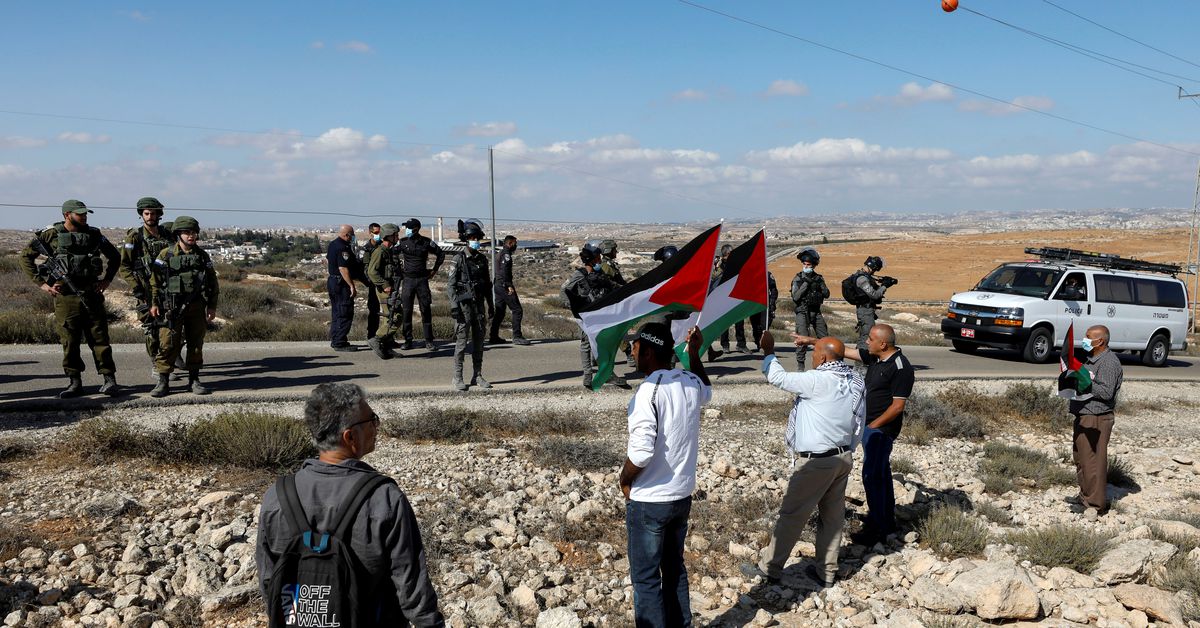Israeli top court to rule on Palestinians’ bid to stop displacement from West Bank homes

Demonstrators hold Palestinian flags as members of Israeli forces stand guard during a protest against Israeli settlements in Masafer Yatta, in the Israeli-occupied West Bank October 23, 2021. REUTERS/Mussa Qawasma/File Photo
JERUSALEM, March 15 (Reuters) – Israel’s Supreme Court held a hearing on Tuesday on petitions against a long-running bid by the Israeli army to displace over 1,000 Palestinian inhabitants from a rural part of the occupied West Bank it designated for military exercises.
After two decades of inconclusive legal maneuvering, the high court is expected to hand down a ruling soon on the army’s move to demolish eight small communities in a rocky, arid area of the southern West Bank near Hebron.
Petitioners say that would make more than 1,000 Palestinians homeless and endanger their distinct, generations-long nomadic way of life, eking out a living from farming and herding.
Register now for FREE unlimited access to Reuters.com Register
“They have been dragging us from one court hearing to another for 22 years,” Othman al-Jabareen, one of the Palestinian petitioners, said in court. “God willing, the justices will let us stay on our land because we have no other option.”
The Israeli state prosecutor told Tuesday’s hearing: “The Israeli military has conclusively stated the crucial importance of this firing zone for military training. We’ve looked into that issue over and over.”
The area, spanning 3,000 hectares (7,400 acres) and known to Palestinians as Masafer Yatta, and to Israelis as the South Hebron Hills, lies close to the West Bank-Israel boundary.
In 1999, the military displaced hundreds of Palestinian inhabitants from their homes after declaring the area a firing zone. Initial petitions were filed in 2000 and a court ordered the Israeli government to allow the residents to return pending a final ruling.
After repeated delays and failed mediation attempts, the government and military filed responses to the Palestinian petitions in 2012.
As the case languished without a definitive outcome over the past two decades, Palestinian residents said they were denied building permits with the army demolishing any new structures including houses, water wells and solar panels. The military, meanwhile, has conducted only sporadic exercises.
Palestinians in the area also say they have struggled to connect to water and electricity networks to which nearby Jewish settlements built on occupied land have access.
“This case is not about a firing zone, it is about taking control of land because unlike other areas, most of this land is privately owned,” said Shlomo Lecker who, along with the Association for Civil Rights in Israel, is representing 200 of the Palestinian families under threat of displacement.
“In effect this is land expropriation without compensation.”
Outside the Jerusalem court, dozens of Israeli protesters opposed to Israel’s occupation of the West Bank since a 1967 war held up signs reading, “Families not firing zones” and “Masafer Yatta is not a military playground”.
Register now for FREE unlimited access to Reuters.com Register
Reporting by Henriette Chacar Editing by Mark Heinrich
Our Standards: The Thomson Reuters Trust Principles.






